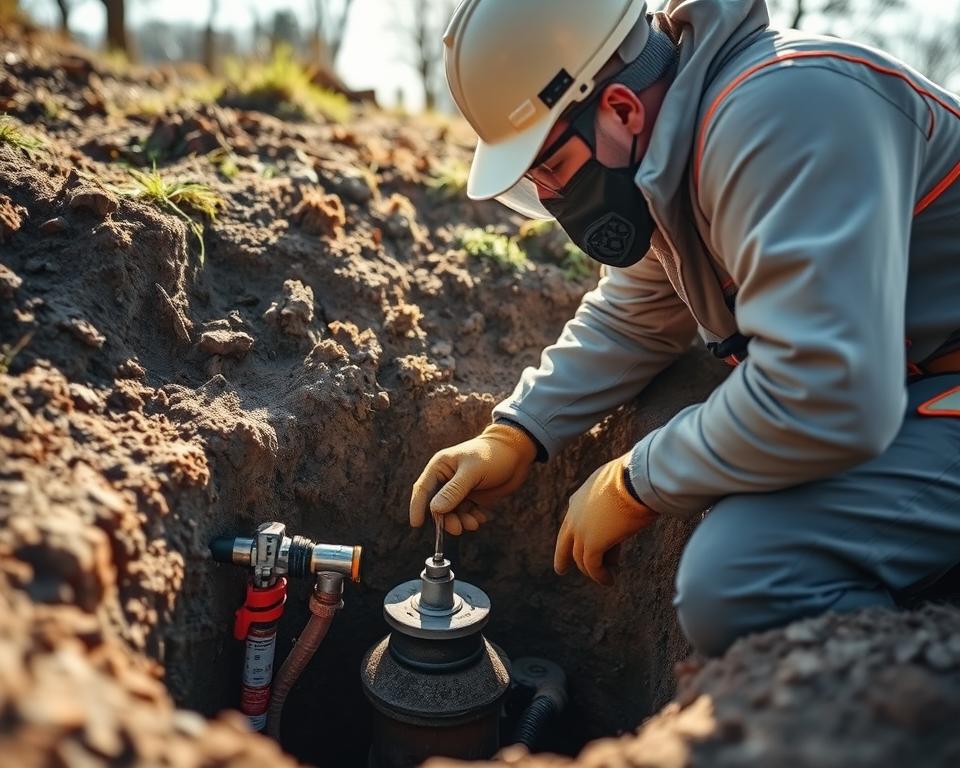Guide to Septic Tank Pump Out: Must-Know Advice & Guidance
Have you considered just where your household waste ends up after it drains from your kitchen sink or loo? It’s managed by a carefully serviced septic system. Comprehending the vital role of septic tank clean-outs is essential for top-notch waste management at home. Neglecting this could lead to backups and costly repairs. Our guide aims to highlight the necessity of septic maintenance and routine pump outs. By relying on reputable septic services – septic tank pumping prices, you shield your home, the environment, and support your system’s long life.
Key Learnings
- Routine septic tank pump out stops system failures and backups.
- Grasping your septic system supports effective maintenance.
- Scheduling a pump out is essential for sound waste management.
- Stay alert to indicators that indicate your septic tank requires service.
- Choosing a certified service provider can improve system efficiency.
- Booking septic tank cleaning services protects your home and the environment.
The Importance of Septic Tank Pump Out
Booking a septic tank pumping service periodically is crucial for your system’s long life and operation. As years pass, your tank collects solid waste and organic debris, that may trigger performance issues or even full system failure. Without septic system maintenance, you could face blocked pipes and damaged drain fields – problems that generally come with high costs and significant inconveniences for homeowners.
By having professional septic tank services carry out routine maintenance, you ensure your system functions properly. This measure not only avoids pricey overhauls but also shields the soil and groundwater around your home from pollution. Scheduling regular pump outs, you foster environmental health and have a reliable and efficient system for managing waste.
Septic System Basics
A conventional septic system is key in handling household wastewater. It’s constituted by the septic tank, drainfield, and soil – components that function in tandem to properly process waste. The septic tank provides a contained space for solid waste to decompose biologically.
It’s important for homeowners to grasp how these parts work. Keeping the septic system in top shape is vital to its longevity and effectiveness. Through regular inspections and cleaning the septic tank when necessary, owners can sidestep costly breakdowns that could lead to serious health and environmental issues.
Regularly taking care of your septic system secures your property and upholds public health. Here, find a table showing the different septic system components and their functions:
| Component | Function |
|---|---|
| Septic Tank | Holds and breaks down solid waste through anaerobic bacteria. |
| Drainfield | Disperses the treated effluent into the soil for further filtration. |
| Soil | Acts as a natural filtering system to further treat wastewater. |
Grasping these elements underscores the need for consistent septic system care. Effective operation requires steady maintenance and cleanings by homeowners.
Pump-Out Frequency Guide
Knowing when to get your septic tank pumped is vital for its proper functioning. Generally, a septic pump out should occur every 3 to 5 years. However, several factors might alter this schedule.
The number of people in your home significantly impacts the pumping frequency. Larger families mean more wastewater, creating a need for more frequent maintenance. Moreover, habits like lots of laundry or prolonged showers might necessitate sooner pump outs. Taking early actions can significantly prolong your septic system’s life.
It’s wise to factor in specific elements, such as tank size and daily water use, to maintain a proper schedule. Noting your last pump out date assists in timely planning for the next one, guaranteeing uninterrupted system performance.
Warning Signals for Pump Out
Homeowners should be alert for indications that suggest their septic tank needs pumping. Slow-draining sinks and toilets often signal an overloaded septic system, reducing the wastewater flow. Moreover, foul smells around your home could spell trouble; they may come from the tank, signalling system failure.
Visible wastewater pooling in the yard is another major indicator. If your lawn has soggy areas or unexplained puddles, it’s likely your septic system is overwhelmed. Ignoring these signs can grow into more severe issues that disturb your home and become costly to resolve.
To avoid serious complications, proactive maintenance is crucial. Hiring a professional service like All in Sanitation can be a wise decision. They can accurately diagnose and rectify these signs. This approach not only fixes immediate issues but also supports your system’s efficiency and health.

Selecting a Pump Out Provider
It’s essential to pick a skilled septic tank pumping service to keep your system operating well. Reputable companies are familiar with the local regulations in depth, ensuring your septic system complies with all requirements. A reliable service, like All in Sanitation, is dedicated to disposing of waste properly. This is important for the environment’s well-being.
In seeking the right septic service, think about these important aspects:
- Experience and Reputation: Aim for companies with excellent feedback and established success in your region.
- Licensing and Insurance: Ensure that your chosen provider has the required license and insurance to cover unexpected problems.
- Comprehensive Services: Select a service that bundles inspections with pumping, identifying issues before they escalate.
Paying for a good septic tank pumping service wards off expensive future repairs. Regular evaluations and consistent upkeep keep your system in excellent form. Picking carefully not only safeguards your investment but also maintains a robust waste management system for your home.
Septic Tank Cleaning: What You Need to Know
For homeowners, septic tank cleaning is necessary to keep the system works well. During this process, extracting sludge and scum is key to avoid blockages. A cleaned system not only runs smoothly but also lasts longer. Scheduling regular cleanings is important for the health of your system.
Many homeowners request extra services to enhance septic tank care. These extras are beneficial for removing harmful bacteria and halting residue build-up. Grasping the value of proper maintenance can save you from expensive fixes. Staying ahead of maintenance guarantees both environmental safety and household well-being.
What Pumping Services Cost
Homeowners should grasp septic tank pumping costs for effective system maintenance. Prices vary greatly due to location, tank size, and chosen service provider. Typically, this service costs between $200 and $600. It’s advisable to collect bids from multiple companies, considering both expertise and reliability.
Service providers like All in Sanitation offer fair rates. Yet, the cost of septic tank cleaning mirrors service quality and thoroughness. Homeowners should consider these aspects judiciously when choosing a service.
Evaluating quotes enables sound decisions that match your budget and septic system needs. Grasping potential costs assists in financial planning for septic tank upkeep.
Keeping Your Septic System Healthy
Looking after your septic system properly is vital. It ensures a durable and efficient setup. By implementing easy steps, the longevity of your septic tank increases, and saves money. Initiatives like minimizing water use in your household make a big difference. Fixing leaks promptly and installing water-saving appliances are wise moves.
It’s important to avoid flushing harmful substances down the drain. Chemicals, fats, or non-biodegradable items damage your septic system. For the integrity of your setup, discard such waste responsibly. This practice safeguards your septic tank’s natural processes.
Regular inspections and the occasional pumping are mandatory for septic maintenance. Try to have your system reviewed and serviced every three to five years. A maintenance schedule or checklist can be very useful. It helps owners in monitoring their system’s condition and adhering to maintenance guidelines.
Taking initiative with septic maintenance brings financial and environmental advantages. By incorporating these habits, homeowners improve their septic systems’ efficiency and dependability. This commitment not only maintains your system but also contributes to a healthier environment.
To Conclude
A septic tank pump out is vital for septic tank upkeep, and residents need to take it with care. It prevents costly fixes and improves the system’s lifespan, ensuring effective operation over years. Recognizing when to act on system distress signals safeguards your property.
Selecting a proven provider, like All in Sanitation, changes the game in septic tank care. Their expertise ensures proper service, supporting both environmental health and your home’s comfort. Proactive maintenance guards your investment and supports a greener planet.
Staying informed about your septic system and its maintenance needs is key. Routine pump outs boost home functionality and bolster public health. For any homeowner, realizing the value of septic tank care ensures a well-functioning living environment for the future.

